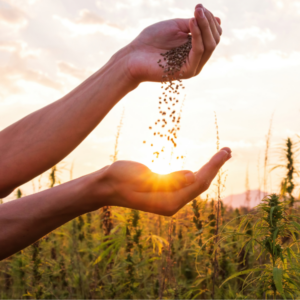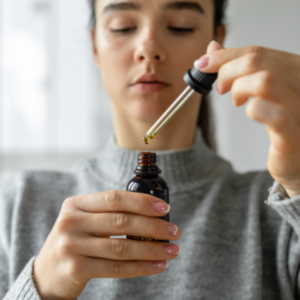Can you use CBD for depression? That’s a difficult question to answer because there isn’t just one level of depression. How severe one’s depression is and how much good quality CBD they have access to matters significantly. But research is promising. CBD for depression isn’t a fringe idea. CBD may even work better than many antidepressants currently on the market.
What is CBD?
CBD stands for Cannabidiol and was first isolated in 1940 by a team from Illinois University. CBD is one of the 113 cannabinoids found in the cannabis or hemp plant. Unlike its famous cousin, Tetrahydrocannabinol (THC), CBD won’t cause the “high” associated with cannabis.
CBD is a cannabinoid which mimics the endocannabinoids the body produces naturally.
What is Depression?
Depression is more just feeling sad or down. It’s a deliberating mood disorder that causes persistent feelings of sadness and loss of interest. In addition to a sense of emptiness or hopelessness, a depressed person may be easily irritable, frustrated over small things, or prone to angry outbursts.
Depression affects how you think, feel, behave, and act. People who are depressed have trouble doing day-to-day activities—ordinary things like grocery shopping or cleaning. In extreme cases, depression can cause the feeling that life isn’t worth living. Severe depression can lead to suicide ideation, even to suicide itself.
Depression isn’t something you can “snap out” of. Depression is a condition that can go beyond mental health. Depression can spill over into physical effects, leading to insomnia, oversleeping, unhealthy weight changes, and unexplained physical issues like headaches or back pain.
What A Depressed Brain Looks Like
Brain scans can help researchers diagnose depression.

Although no test can reveal depression in the same way a brain scan detects tumours or other diseases. Researchers know which neurochemicals to look for, but the process of identifying the correct neural pathways that lead to depression isn’t so clear-cut.
Researchers once believed depression was due to a deficiency of a neurotransmitter called norepinephrine. Until recently, it was popular to blame depression on too little serotonin. Today, researchers regard depression as far too complicated to blame on any single neurochemical.
People with depression tend to release more significant amounts of cortisol than the average person. Cortisol is a stress hormone. The long-term effects of releasing more cortisol than average means the brain will shrink. Researchers have found women with depression to have smaller hippocampi than women without depression.
The amygdala regulates emotions. People with depression have a more active amygdala. Researchers suspect increased levels of cortisol are to blame. But overall, the debate is still ongoing. It’s the chicken and the egg problem.
Do altered brain structures and chemicals cause depression? Or is that a result of depression? Combined with substance abuse, which many depressed people suffer from, trying to root out the cause becomes even more problematic.
How Antidepressants Work
There are many antidepressants on the market for depression. They all generally work by targeting the brain’s neurotransmitters, mainly serotonin and norepinephrine.
Selective serotonin reuptake inhibitors, or SSRIs, block neurons from taking back serotonin. Monoamine oxidase (MAO) breaks down neurotransmitters. This increases more “messengers” for neurons.
Generally, antidepressants work by targeting neurotransmitters.
How CBD Works for Depression
CBD works for depression by working with the body’s endocannabinoid system (ECS). Endocannabinoids act as neurotransmitters in our nervous system. The ECS helps regulate our mood, appetite, sleep, pain perception, motor function, and immune system.

CBD is an external cannabinoid that binds to our cannabinoid receptors. CBD can help produce the “feel-good” chemicals like dopamine and serotonin.
If you think of the body as a busy city street, the ECS is like the traffic lights and walk signs. It regulates our bodily system, sending and receiving signals to keep everything in balance.
The ECS is why researchers have become so interested in studying cannabinoids. CBD influences the ECS, positively affecting disorders like depression or symptoms of diseases like cancer.
So how does CBD work for depression? One study proved CBD was like an antidepressant by looking at its effect on serotonin levels in the brain. CBD can also raise our natural endocannabinoid levels.
For example, CBD is a reuptake inhibitor of anandamide. It helps regulate the neurotransmitter known for playing a role in our appetite, motivation, and pleasure. Anandamide comes from the Sanskrit word for “bliss.”
Overall, CBD works for depression by regulating serotonin and endocannabinoids. Additionally, CBD allows the brain to form new neural connections. So a depressed person may find CBD beneficial since it helps rewire the brain.
Benefits of CBD for Depression
CBD for depression has many benefits. It is safe and has no adverse side effects, unlike many antidepressants. But because CBD can potentially interact with one of these other antidepressant medications, you should speak to your doctor before trying it.
If you decide to try CBD for depression, you have plenty of options other than smoking it. (Although, whether you prefer herbs or hash, smoking can be the quickest delivery method to your system). There is also the option to vape it if you don’t feel comfortable smoking.
CBD oil drops are probably your best bet for effective and accurate dosages. They are also easy to carry around.
CBD beverages are another option if you’re not interested in CBD oil. You can also mix CBD powder into a beverage you make at home. You can also make CBD tea.
Additionally, there is a CBD balm which you apply like an ointment.
There are many ways to find relief when it comes to CBD for depression. You can experiment with a dosage that works best for you, but a general rule is to try 5mg of CBD for every 10 pounds of body weight. While your age and metabolism can play a factor, CBD for severe depression may require higher doses.
In Summary
If you’ve found antidepressants aren’t working or have too many unpleasant side effects – CBD might be for you. Not only does CBD target the same areas of the brain as traditional antidepressants, but CBD can also form new neural pathways.
This makes CBD a unique natural antidepressant for someone trying alternative treatments. Do you or someone you know have depression? CBD might be the game-changer they need.





